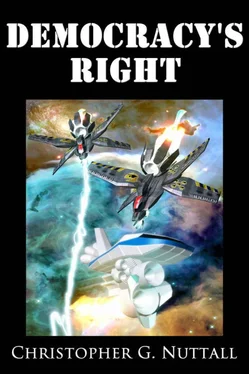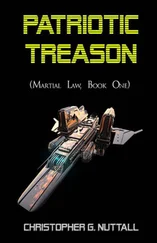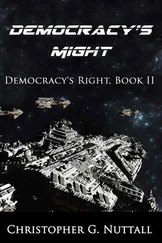He couldn’t disagree with Admiral Percival’s assessment of the situation. If the rebels had hijacked superdreadnaughts from another part of the Empire, he would have heard something about it, if only whispers passed down through the grapevine. The superdreadnaughts he was advancing towards couldn’t be real, even though they were the most advanced decoys he’d ever seen, which suggested that the remainder of the rebel fleet could be nothing more than drones too. If Commander Walker was actually trying to distract them while causing havoc elsewhere… well, at least he wouldn’t look bad. After Stacy Roosevelt had lost an entire squadron of superdreadnaughts to mutineers, it was hard to imagine anything that would have made him look worse.
“Commodore,” the tactical officer reported, “we are entering firing range.”
“Good,” Commodore William said. He wasn’t used to commanding sixteen superdreadnaughts instead of nine, but his officers were used to him and he had managed to add the newcomers into the datanet without causing undue disruption. Percival had ordered him to open fire as soon as he entered range, yet Commodore William intended to wait and see if he could separate the drones from the real starships. It was alarmingly possible that the original nine superdreadnaughts, the first ones to be detected, were drones and the real superdreadnaughts had been concealing themselves… or perhaps he was just driving himself mad with paranoia. There was no way to know for sure. “Prepare to engage…”
The display went mad as alarms howled through the massive ship. Thousands of missiles were spewing out of the enemy fleet, roaring towards his fleet. The superdreadnaughts were real ! They had to be real. Nothing else could have produced that level of firepower, nothing else could account for it. The rebels had somehow obtained an entire fleet and were deploying it to attack Camelot. His thoughts raced round and round in circles, unable to accept what he was seeing. The rebels had done the impossible. They had assembled eighty-one superdreadnaughts with external racks and fired them in one massive volley.
He swallowed hard, cursing his own failure to order the drives powered up. He might have been able to escape, yet… that would only have meant disaster for him anyway. His career had just been destroyed, even with… it dawned on him that he wasn’t dealing with the real problem, but there was no way to deal with it, or escape so many missiles. He could pick off two-thirds of them with his point defence and the remaining third would be enough to obliterate his fleet. Sixteen superdreadnaughts were about to die and it was his fault!
“Return fire,” he ordered, hoarsely. It wasn’t the commanding voice he’d been taught to use at the Academy, but no one could have remained steady in the teeth of so many missiles. The fire of sixteen superdreadnaughts, external racks or no external racks, couldn’t hope to match the onrushing wave of destruction advancing towards him. Hell, the rebels should have had problems trying to coordinate that many missiles, yet somehow they were controlling them perfectly. “All point defence weapons are cleared to engage. I say again, all point defence weapons are clear to engage.”
Sixteen superdreadnaughts carried a great deal of point defence and they were escorted by sixty-nine smaller ships, all linked into a datanet that hadn’t been designed to handle so many incoming missiles at once. Its designers had assumed that there were limits to how many missiles could be deployed; never, in their worst nightmares, had they imagined a missile storm like the one advancing towards them. There were so many missiles that their emissions seemed to blur into one another, making it harder to even begin targeting them. Hundreds of missiles vanished as the point defence network struck them down, but thousands survived to make it through and hammer against his shields. Red icons flashed and vanished on his display as the smaller ships were vaporised — the rebels hadn’t restricted their targeting to the superdreadnaughts alone — their shields and defences unable to stand up to the onslaught. His superdreadnaughts seemed to cling together — as if they could provide mutual support by moving closer — but it was already too late. A deluge of missiles fell upon them.
“Signal the rebels,” Commodore William ordered. His career and the opinion of Admiral Percival no longer mattered. “Tell them we surrender!”
“It’s too late,” the tactical officer said. “They’re entering terminal attack phase…”
The missiles slammed home. The superdreadnaught might have shrugged off one missile or ten missiles or even a hundred missiles, but so many impacting so close together was beyond her ability to survive. As fireballs blazed out on her shields, the shield generators failed, allowing the rebels missiles to slam into the hull and start to explode within the hull. A series of tearing explosions blew the flagship into nothing more than expanding plasma. The remainder of the squadron followed it into death seconds later.
* * *
“My God,” Colin breathed, as the final superdreadnaught vanished. No one had ever seen sixteen superdreadnaughts destroyed so rapidly, not even during the First Interstellar War. Since time out of mind, the tactics of space warfare had been determined by weight of fire and, now, the Geeks had introduced a whole new variable into the equation. The arsenal ships might be a one-shot weapon, they might not have the shielding or armour of superdreadnaughts, they might have the manoeuvring capability of a wallowing pig, but they had just changed the face of warfare. Every Academy graduate knew that if the first punch was heavy enough, there would be no need to throw a second.
He watched, as if from a far distance, as Commodore William’s missiles roared into his fleet. The Commodore obviously hadn’t been able to sort the real superdreadnaughts out from the decoys — or perhaps he just hadn’t had time to update his command missiles with the new data. Of course, the sudden wave of missiles — far more than nine superdreadnaughts could launch — had been a very convincing argument. Colin rather regretted Commodore William’s death, even if he had been on the wrong side. The aging naval officer had been a good and decent — if limited — man.
“Only a relative handful of missiles tracked our real ships,” the tactical officer said. “The remainder went after the drones.”
Colin nodded. One of the other great limiting factors in space warfare was that missile drives — while overpowered to a level no manned starship could survive — burned out quickly. Once the missiles realised their mistake, if they realised their mistake, they would have no time to seek another target before it was too late. The debris of the battlefield would have to be swept carefully, in case a stray missile hadn’t been programmed to destroy itself once it lost power, but they were little threat to an alert starship.
The Empire wouldn’t fall for the same trick twice, Colin knew, but for the moment it hardly mattered. Besides, if some of the other programs the Geeks had talked about became a reality, Colin would never have to worry about running out of tricks.
“Open a channel,” he ordered. He waited for the channel to open. “Admiral Percival, as you can see, my fleet is no bluff.” And now, he knew, he was bluffing. The arsenal ships would have to withdraw, reload from the ammunition ships and return before he could launch a second massive salvo. And even then, he might not have enough to crack the defences of Camelot. “I have killed thousands of your loyalists in proving that I can destroy you.”
He took a breath. “Surrender now and you will live,” he added. He didn’t want to make any promises, yet… did he have any choice? “If you continue to resist me, I will be forced to destroy Camelot and its orbiting facilities.”
Читать дальше












